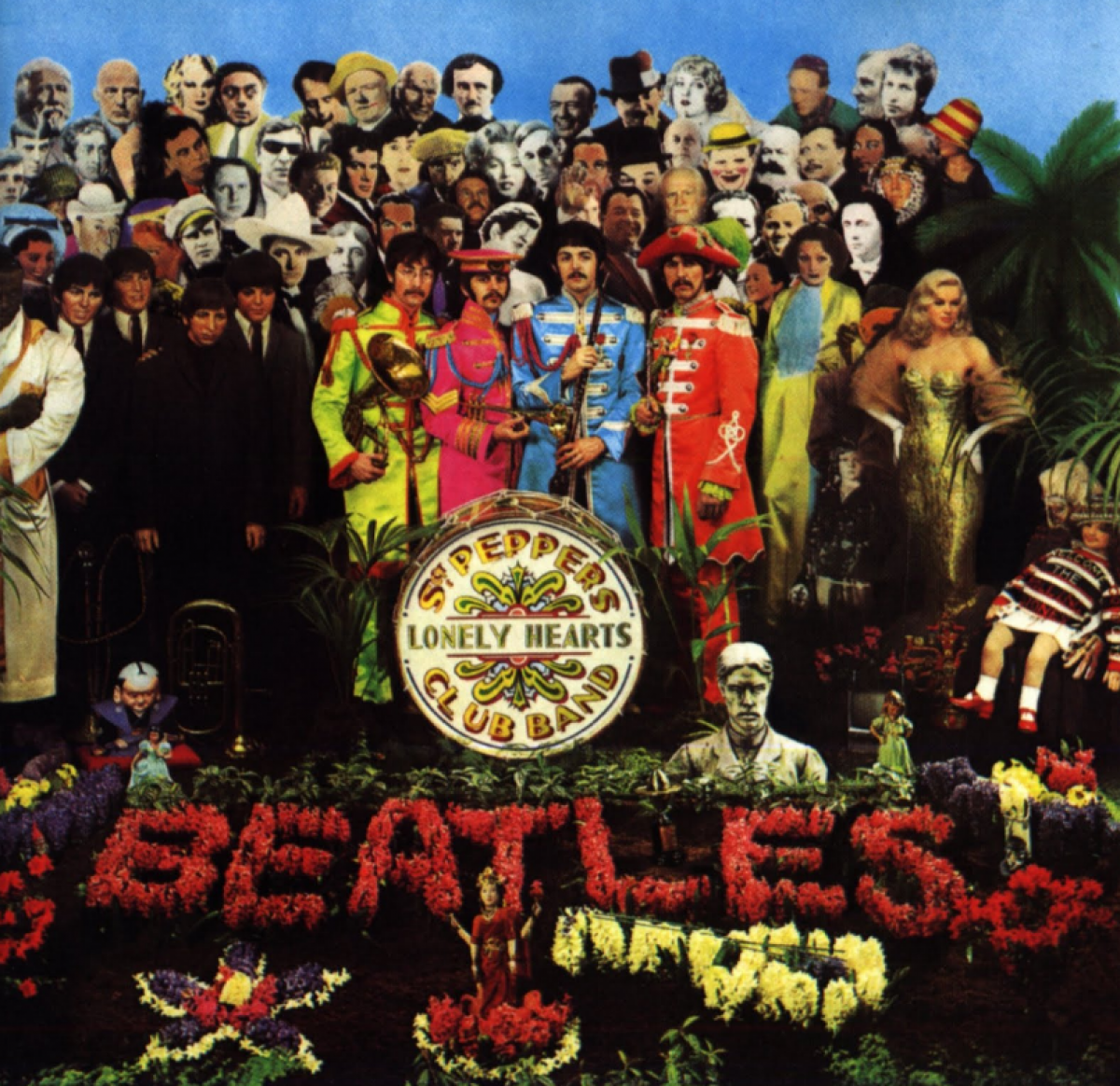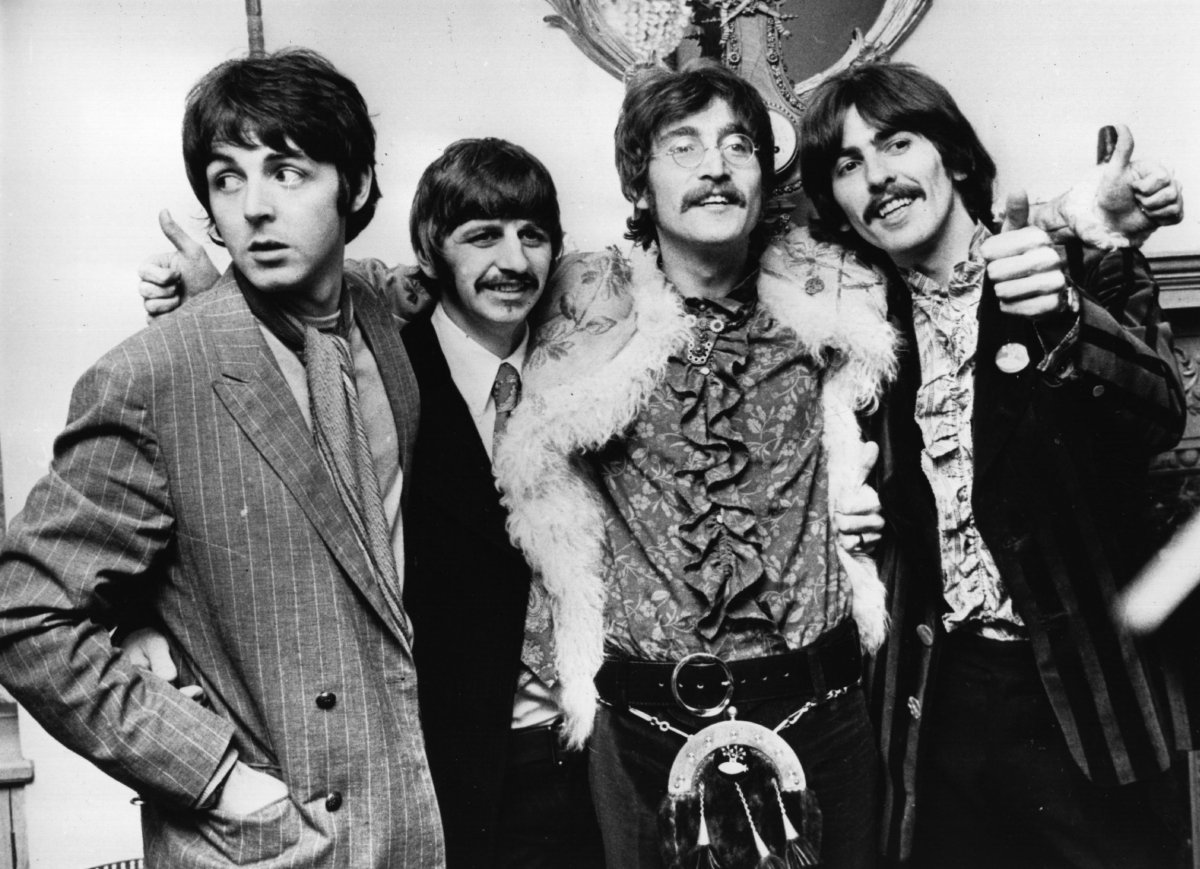Sgt. Pepper's Lonely Hearts Club Band marked lots of milestones.
The landmark Beatles album was the first rock album to be honored with the Grammy award for album of the year. It was the record where the Beatles' transformation from four-piece rock band to mad-genius studio provocateurs was complete. It was the first major album to be mastered without pauses between tracks (note the crossfade between the title track and "With a Little Help From my Friends"). It was certainly the world's first pop album that concludes with an ultra-high frequency intended to annoy dogs.
Basically, if an alien landed in your apartment and demanded to hear the album that best sums up 20th-century achievements in pop songwriting on planet earth, you'd reach for Sgt. Pepper's. (Or maybe you would play the alien Tragic Kingdom by No Doubt. What the hell do I know about your personal taste. I shouldn't make assumptions.)
Anyway: Sgt. Pepper's, which celebrates its 50th anniversary this week, is also commonly credited with a more controversial milestone: namely, that it was the world's first concept album. That's a reference to the unusual band-within-a-band concept: Sgt. Pepper's was supposed to represent a fictional performance by Sgt. Pepper's nonexistent band, hence the orchestral tuning and simulated crowd sounds.
But was it really the first concept album? Was it even a concept album at all? Beatles experts and music historians often quibble on this point. (To misquote "Hello Goodbye": "Some say yes, some say no.") In order to arrive at a satisfactory answer, let's start with a somewhat simpler question: What the hell is a concept album anyway?
That's easy. It's exactly what it sounds like: an album with an overarching concept. Merriam-Webster defines the term as "a collection of songs about a specific theme or story." The leading scholarly authority Urban Dictionary writes: "Usually, each individual track expresses a different aspect or part of the main concept, with each track fitting together to form a cohesive idea." The theme might be explicitly stated (for instance, Murder Ballads by Nick Cave consists of nothing but songs about, well, murder), or it might be more oblique (for example, Skylarking by XTC is generally considered to be a song cycle about the various phases of life, from first love to marriage to death). The most extreme type of concept album is probably a rock opera, in which the album has a story line with characters and a plot arc and such. Notable examples of rock operas include The Who's Quadrophenia, Pink Floyd's The Wall and, more recently, Green Day's American Idiot.

Sgt. Pepper's is not a rock opera. There's no discernible plot. But it does have a concept, which Paul McCartney came up with during a flight in 1966. According to producer George Martin, this is how the concept materialized:
"Sergeant Pepper" itself didn't appear until halfway through making the album. It was Paul's song, just an ordinary rock number ... but when we had finished it, Paul said, "Why don't we make the album as though the Pepper band really existed, as though Sergeant Pepper was making the record? We'll dub in effects and things." I loved the idea, and from that moment on it was as though Pepper had a life of its own.
This whimsical concept is embedded in the album title, in the way the record begins ("So may I introduce to you / The act you've known for all these years!") and in the iconic album art, which pictures the Beatles in the colorful, military-style costumes of their alter egos. The trouble is that the album basically abandons the concept after track two (""With a Little Help from My Friends," which Ringo sings as his alter ego, Billy Shears), only to pick it up again with the "Sgt. Pepper's Lonely Hearts Club Band (Reprise)" 10 tracks later.
So it's a concept album only insofar as fewer than half of the songs reflect the concept. John Lennon even admitted that his songs (such as "Lucy in the Sky with Diamonds" and "Being for the Benefit of Mr. Kite!") had nothing to do with the concept. "Sgt. Pepper is called the first concept album, but it doesn't go anywhere. All my contributions to the album have nothing to do with this idea of Sgt. Pepper and his band; but it works 'cause we said it worked," Lennon said in 1980. "But it was not as put together as it sounds, except for Sgt. Pepper introducing Billy Shears and the so-called reprise. Every other song could have been on any other album." (This arguably is a good thing. Had the Beatles insisted on making every song a part of the concept, they might have discarded some great material or made the whole thing insufferably cutesy.)
By a very strict definition of what constitutes a concept album, Sgt. Pepper's doesn't qualify because it strays away from its concept. But most definitions are looser, and there are two significant albums that preceded Sgt. Pepper's and are sometimes considered concept albums in their own right. The first is Pet Sounds by the Beach Boys (released in May, 1966). The second is Freak Out! by Frank Zappa and the Mothers of Invention (released the following month).

The Pet Sounds claim is dubious. Though it was enormously groundbreaking in its compositional and lyrical ambition, there is no coherent concept beyond the animal theme that crops up in the cover image and some sound effects. According to Brian Wilson, "It wasn't really a song concept album, or lyrically a concept album; it was really a production concept album." But a particular approach to production doesn't exactly cohere as a concept. Pet Sounds is simply a great album. Not every great album has to be a concept album.
Freak Out!, on the other hand, might be identified as a mercilessly sardonic concept album meant to satirize sixties popular culture. "All the songs on it were about something," Zappa later wrote in his memoir. "Each tune had a function within an overall satirical concept."
Related: Frank Zappa's scathing wit comes back to life in a new documentary
And it beat Sgt. Pepper's by a whole year. Though Zappa is rarely mentioned in the same breath as the Beatles (too vulgar, too hostile toward the mainstream), Freak Out! had a profound influence on McCartney, who reportedly kept repeating "This is our Freak Out!" while in the studio with the Beatles. Alas, he failed to record anything as, well, freakish as "Help, I'm a Rock."
Zappa was ahead of the Beatles in other ways too: He made one of the earliest double albums, and he experimented with sound collage and noise before it was cool. (The Beatles played catch-up on The White Album.) Zappa dabbled with more plot-oriented concept albums later on, too, with the multi-part Joe's Garage.
All of this is to say: Sgt. Pepper's was not the first concept album, but it did popularize the form.
In his 1988 book on the Beatles, the writer Tim Riley puts it best: "Freak Out! has claims as the first 'concept album', but Sgt. Pepper was the record that made that idea convincing to most ears." Indeed, the world was convinced.
Uncommon Knowledge
Newsweek is committed to challenging conventional wisdom and finding connections in the search for common ground.
Newsweek is committed to challenging conventional wisdom and finding connections in the search for common ground.
About the writer
Zach Schonfeld is a senior writer for Newsweek, where he covers culture for the print magazine. Previously, he was an ... Read more
To read how Newsweek uses AI as a newsroom tool, Click here.








